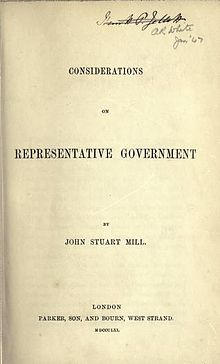
John Stuart Mill was an English philosopher, political economist, politician and civil servant. One of the most influential thinkers in the history of liberalism, he contributed widely to social theory, political theory, and political economy. Dubbed "the most influential English-speaking philosopher of the nineteenth century" by the Stanford Encyclopedia of Philosophy, he conceived of liberty as justifying the freedom of the individual in opposition to unlimited state and social control.
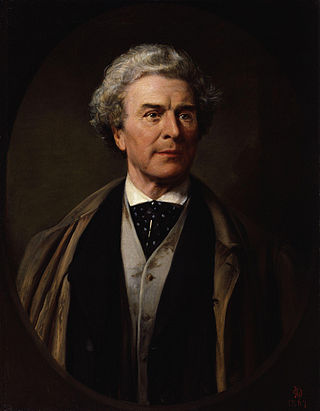
Thomas Hare was a British lawyer and supporter of electoral reform. He is credited with inventing the single transferable vote system of proportional representation which he was a proponent and defender, now used in national elections in Ireland and Malta, in Australian Senate and state elections, in local and European Parliament elections in Northern Ireland, and several cities in the U.S., New Zealand and Scotland.

Jeremy Bentham was an English philosopher, jurist, and social reformer regarded as the founder of modern utilitarianism.

Alexander Bain was a Scottish philosopher and educationalist in the British school of empiricism and a prominent and innovative figure in the fields of psychology, linguistics, logic, moral philosophy and education reform. He founded Mind, the first ever journal of psychology and analytical philosophy, and was the leading figure in establishing and applying the scientific method to psychology. Bain was the inaugural Regius Chair in Logic and Professor of Logic at the University of Aberdeen, where he also held Professorships in Moral Philosophy and English Literature and was twice elected Lord Rector of the University of Aberdeen.
Deliberative democracy or discursive democracy is a form of democracy in which deliberation is central to decision-making. Deliberative democracy seeks quality over quantity by limiting decision-makers to a smaller but more representative sample of the population that is given the time and resources to focus on one issue.

James Mill was a Scottish historian, economist, political theorist and philosopher. He is counted among the founders of the Ricardian school of economics. He also wrote The History of British India (1817) and was one of the prominent historians to take a colonial approach. He was the first writer to divide Indian history into three parts: Hindu, Muslim and British, a classification which has proved surpassingly influential in the field of Indian historical studies.

William Bradford was an early American colonial printer and publisher in British America. Bradford is best known for establishing the first printing press in the Middle colonies of the Thirteen Colonies, founding the first press in Pennsylvania in 1685 and the first press in New York in 1693. Bradford operated continuously printing establishments for sixty-two years, heading a family that would include printers and publishers for 140 years. He was also known for controversies regarding freedom of the press. Starting his printing career in London, Bradford emigrated to America in 1685. He established, with others, the first paper mill to appear in the Thirteen American Colonies.
A Hobson's choice is a free choice in which only one thing is actually offered. The term is often used to describe an illusion that choices are available. The best known Hobson's choice is "I'll give you a choice: take it or leave it", wherein "leaving it" is strongly undesirable.
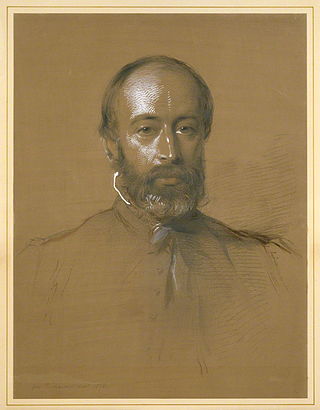
Sir Arthur Helps was an English writer and dean of the Privy Council. He was a Cambridge Apostle and an early advocate of animal rights.
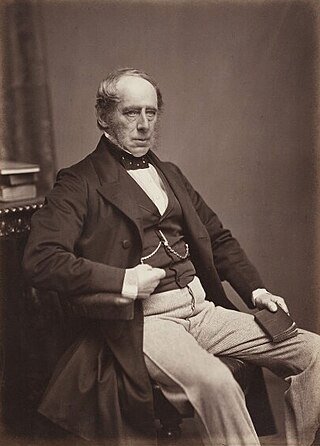
John Somerset Pakington, 1st Baron Hampton,, known as Sir John Pakington, Bt, from 1846 to 1874, was a British Conservative politician.

On Liberty is an essay published in 1859 by the English philosopher John Stuart Mill. It applied Mill's ethical system of utilitarianism to society and state. Mill suggested standards for the relationship between authority and liberty. He emphasized the importance of individuality, which he considered a prerequisite to the higher pleasures—the summum bonum of utilitarianism. Furthermore, Mill asserted that democratic ideals may result in the tyranny of the majority. Among the standards proposed are Mill's three basic liberties of individuals, his three legitimate objections to government intervention, and his two maxims regarding the relationship of the individual to society.

Liberty is the state of being free within society from oppressive restrictions imposed by authority on one's way of life, behavior, or political views. The concept of liberty can vary depending on perspective and context. In the Constitutional law of the United States, Ordered liberty means creating a balanced society where individuals have the freedom to act without unnecessary interference and access to opportunities and resources to pursue their goals, all within a fair legal system.

Utilitarianism is an 1861 essay written by English philosopher and economist John Stuart Mill, considered to be a classic exposition and defence of utilitarianism in ethics. It was originally published as a series of three separate articles in Fraser's Magazine in 1861 before it was collected and reprinted as a single work in 1863. The essay explains utilitarianism to its readers and addresses the numerous criticism against the theory during Mill's lifetime. It was heavily criticized upon publication; however, since then, Utilitarianism gained significant popularity and has been considered "the most influential philosophical articulation of a liberal humanistic morality that was produced in the nineteenth century."
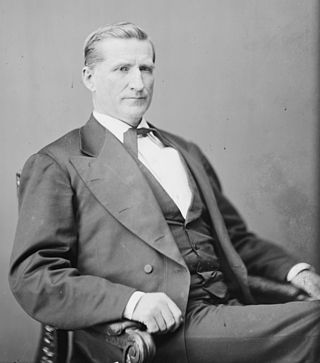
John Goode Jr. was a Virginia attorney and Democratic politician. He served in both the United States Congress and the Confederate Congress, and was a colonel in the Confederate Army. He was Solicitor General of the United States during the presidency of Grover Cleveland. He was known as "the grand old man of Virginia".

Empire Mine State Historic Park is a state-protected mine and park in the Sierra Nevada mountains in Grass Valley, California, U.S. The Empire Mine is on the National Register of Historic Places, a federal Historic District, and a California Historical Landmark. Since 1975 California State Parks has administered and maintained the mine as a historic site. The Empire Mine is "one of the oldest, largest, deepest, longest and richest gold mines in California". Between 1850 and its closure in 1956, the Empire Mine produced 5.8 million ounces of gold, extracted from 367 miles (591 km) of underground passages.
Congressional oversight is oversight by the United States Congress over the executive branch, including the numerous U.S. federal agencies. Congressional oversight includes the review, monitoring, and supervision of federal agencies, programs, activities, and policy implementation. Congress exercises this power largely through its congressional committee system. Oversight also occurs in a wide variety of congressional activities and contexts. These include authorization, appropriations, investigative, and legislative hearings by standing committees; which is specialized investigations by select committees; and reviews and studies by congressional support agencies and staff.
Sir John Bryant Bourn was a British auditor who was the Comptroller and Auditor General and therefore a head of the National Audit Office.
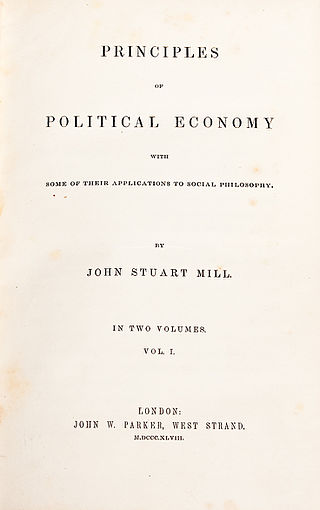
Principles of Political Economy (1848) by John Stuart Mill was one of the most important economics or political economy textbooks of the mid-nineteenth century. It was revised until its seventh edition in 1871, shortly before Mill's death in 1873, and republished in numerous other editions. Beside discussing descriptive issues such as which nations tended to benefit more in a system of trade based on comparative advantage, the work also discussed normative issues such as ideal systems of political economy, critiquing proposed systems such as communism and socialism. Along with A System of Logic, Principles of Political Economy established Mill's reputation as a leading public intellectual. Mill's sympathetic attitude in this work and in other essays toward contemporary socialism, particularly Fourierism, earned him esteem from the working class as one of their intellectual champions.
Samuel Bourn (1714–1796) was an English Dissenter minister.
John William Parker was an English publisher and printer.
